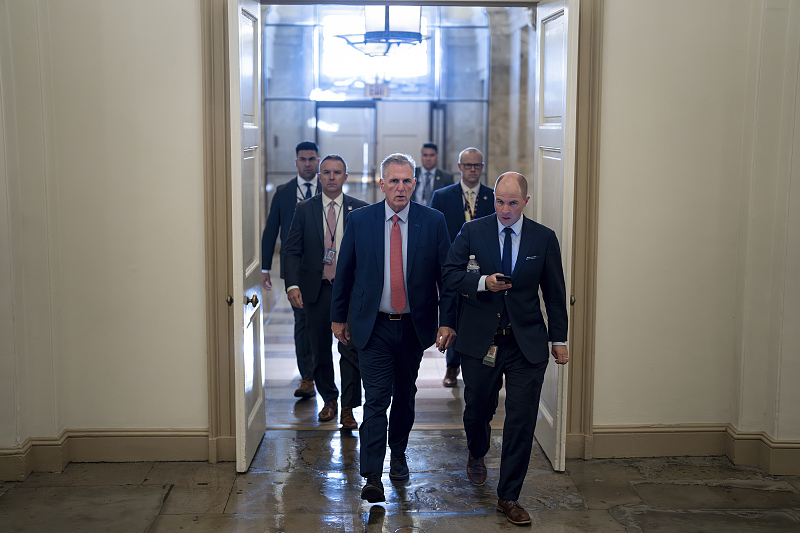
Editor's note: Shahid Hussain, a special commentator on current affairs for CGTN, is the founder and CEO of the UAE-based company Green Proposition. The article reflects the author's opinions, and not necessarily the views of CGTN.
As the United States stands precariously at the edge of an impending government shutdown and a looming debt ceiling crisis, the nation finds itself ensnared in a disquieting labyrinth of political tumult. While it is imperative to acknowledge that the challenges confronting any government are multifaceted and often formidable, it is equally crucial to scrutinize the circumstances that have ushered in this precarious juncture.
At the core of this intricate tableau lies a profound disconnect between the government's obligation to meet its financial commitments and its capacity to forge compromises to secure the fulfillment of these obligations. The impasse over the debt ceiling, a recurring spectacle in the theater of politics, once more assumes the central role, leaving both citizens and the global financial realm in anxious anticipation for the final result.
It is not unreasonable to ponder why the debt ceiling – a mechanism conceived to ensure fiscal prudence – has evolved into a recurrent flashpoint for political brinkmanship. The debt ceiling, originally devised as a safeguard, has been transformed into stage for partisan theatrics. Such manipulation of a pivotal fiscal instrument unavoidably casts a shadow of doubt upon the government's commitment to the financial well-being of its populace.
This conundrum is further compounded by the looming specter of a government shutdown. As the clock ticks by, the nation confronts the grim specter of federal employees facing furloughs, essential services thrown into disarray, and heightened economic uncertainty. While government shutdowns are not unprecedented, their growing frequency has sown doubt about the government's capacity to function cohesively and responsibly.
Detractors argue that the recurring specter of government shutdowns has normalized a state of perpetual crisis, where the routine operations of the government hinge upon last-minute negotiations. The fact that such negotiations often become entangled in unrelated policy disputes only exacerbates the disillusionment felt by many Americans who simply yearn for a stable and functioning government.

Speaker of the U.S. House of Representatives Kevin McCarthy arrives at the Capitol in Washington, D.C., as Congress faces a deadline to fund the government by the end of the month, or risk a potentially devastating federal shutdown, September 12, 2023. /CFP
Speaker of the U.S. House of Representatives Kevin McCarthy arrives at the Capitol in Washington, D.C., as Congress faces a deadline to fund the government by the end of the month, or risk a potentially devastating federal shutdown, September 12, 2023. /CFP
It is within this context that a measure of criticism is justly directed at the government. The cycle of debt ceiling disputes and threats of government shutdowns exposes a governance failure – one that jeopardizes the nation's financial stability and global reputation. While acknowledging the intricacy of the issues at play, it is equally vital to demand a heightened level of responsibility from elected officials.
In the quest to alleviate the burdensome national debt, policymakers must embrace a holistic approach that seamlessly blends fiscal prudence with strategies to fortify economic prosperity. Foremost, an unwavering commitment to restraining government expenditure takes center stage. This demands a meticulous examination of existing programs, an elimination of inefficiencies and redundancies, a dedicated focus on essential services, and a reduction in federal spending. Simultaneously, the implementation of equitable and balanced tax reforms can serve as a catalyst for bolstering revenue, effectively bridging the gaping fiscal divide.
Concurrently, nurturing economic expansion through strategic investments in infrastructure, innovation, and education possesses the potential to broaden the tax base and yield sustainable financial dividends. Furthermore, addressing entitlement reform, encompassing vital programs such as Social Security and Medicare, becomes imperative to ensure their long-term viability while sparing future generations from undue burdens. Ultimately, bipartisan collaboration and an unwavering commitment to meticulous, long-term fiscal planning stand as linchpins in the pursuit of sustainable debt reduction, all while safeguarding the nation's economic prospects.
The citizens deserve a government that places their well-being above partisan agendas, one that operates with foresight rather than resorting to last-minute crisis management. The repetitive episodes of political brinkmanship, culminating in the current quagmire, erode public trust and magnify the sense of disenchantment with the political process.
In conclusion, the ongoing predicament of an impending government shutdown and a debt ceiling crisis serves as a stark reminder of the challenges confronting American governance. While recognizing the inherent complexities of governing a nation as vast and diverse as the United States, it is incumbent upon the government to transcend the partisan fray and prioritize the stability and welfare of its citizens. The recurring cycle of fiscal crises diminishes the nation's stature and erodes public trust, ultimately compromising the very essence of responsible governance.
(If you want to contribute and have specific expertise, please contact us at opinions@cgtn.com. Follow @thouse_opinions on Twitter to discover the latest commentaries in the CGTN Opinion Section.)